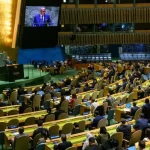The implementation of the African Continental Free Trade Area (AfCFTA) should be expedited as the free trade zone will boost intra-African trade and accelerate industrialization, the Economic Commission for Africa (ECA) Acting Executive Secretary, Antonio Pedros, has urged.
“While the AfCFTA’s promise is high, that promise can be realized only if the Agreement is implemented efficiently,” Pedro said, admitting that implementing the AfCFTA Agreement and supporting African economies, particularly Least Developed Countries (LDCs), was no small task.
In remarks at the opening of the Regional consultation on LDC5 for LDCs in Africa and Haiti, Mr. Pedros said the Doha Programme of Action for Least Developed Countries was timely for Africa whose economies have been impacted by the Covid pandemic and the Ukraine war.
The regional consultation on LDC5 for LDCs is taking stock of trade elements of the Doha Programme of Action for the Least Developed Countries for the Decade 2022-2031 (DPOA). The regional consultation is organized by the World Trade Organisation and United Nations Office of the High Representative for LDCs (UN OHRLLS), in cooperation with the Enhanced Integrated Framework (EIF).
Welcoming the Doha Programme of Action for focusing on increasing LDCs exports and accelerating digital transformation & building institutional capacities, which were critical to Africa which has 33 of the world’s 46 LDCs.
The AfCFTA holds great promise to help LDCs recover and accelerate growth. ECA’s latest empirical assessment of the AfCFTA reform reveals that Its successful implementation will positively impact Africa’s GDP, trade and welfare.
With the AfCFTA Agreement in place, intra-African trade could be 34% higher in 2045 than without the AfCFTA in the same year. Hence the effective implementation of the AfCFTA Agreement will help Africa industrialize and diversify away from energy and mining, said Pedro.
The ECA has facilitated deepening Africa’s participation in the battery and electric vehicle value chains through current investment projects in the Democratic Republic of Congo and Zambia. In addition, the ECA’s work on the transboundary agro-industry park and special economic zone involving Zimbabwe and Zambia was promising and it would equip the two land-locked and least developed countries to become bread baskets for Southern Africa and possibly Africa.





